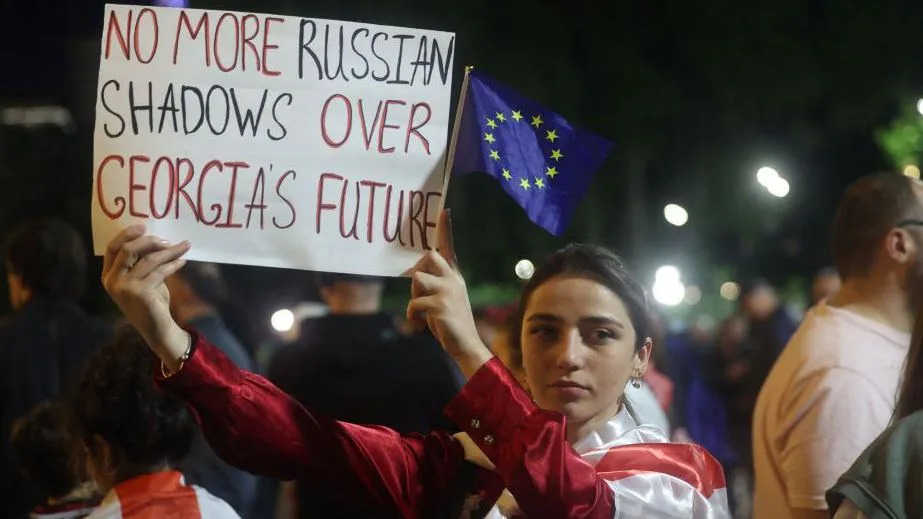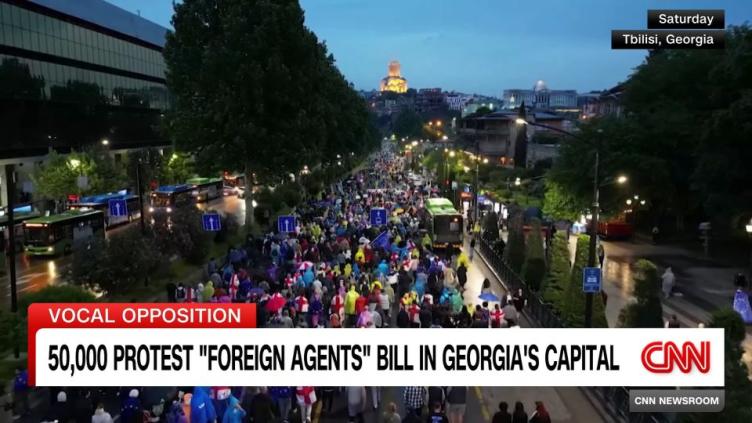Reuters
Sat, May 11, 2024
About 50,000 opponents of a “foreign agents” bill marched peacefully in heavy rain through the Georgian capital on Saturday, after the United States said the country had to choose between the “Kremlin-style” law and the people’s Euro-Atlantic aspirations.
“We are deeply alarmed about democratic backsliding in Georgia,” White House national security adviser Jake Sullivan wrote on X.
“Georgian parliamentarians face a critical choice – whether to support the Georgian people’s Euro-Atlantic aspirations or pass a Kremlin-style foreign agents’ law that runs counter to democratic values,” he said. “We stand with the Georgian people.”
The bill, which would require organizations receiving more than 20% of their funding from abroad to register as “agents of foreign influence,” has touched off a rolling political crisis in Georgia, where thousands have taken to the streets to demand the bill be withdrawn.
The crowd on Saturday waved Georgian, European Union and some Ukrainian flags and in a break with the past, included more older protesters as well as the many young people who have thronged the streets over the past month.

Demonstrators protest against the foreign agents bill in Tbilisi, Georgia, on May 11, 2024. - Irakli Gedenidze/Reuters
“The government should hear the free people of Georgia,” said one protester in her 30s who gave her name as Nino, waved a large Georgian flag and led one of three columns that converged on the city center, which blocked many of the city’s roads and filled the cobblestoned heart of Tbilisi’s old town.
“We want to enter the European Union with our proud nation and our dignity,” she said.
Anuki, a 22-year-old student of acting, said it was her generation’s responsibility “to make sure that our future and the future of generations after us are safe, that they have freedom of speech, and they are free, basically.”
“And we don’t want to be part of Russia,” she added. “We never wanted to be part of Russia. And it has always been and always will be our goal to be part of Europe.”
Parliament, which is controlled by the ruling Georgian Dream party and its allies, will begin committee hearings on the bill’s third and final reading on Monday. Opposition groups had called for a fresh wave of protests from Saturday.
The crisis has pitted the Georgian Dream ruling party against a coalition of opposition parties, civil society, celebrities and the country’s figurehead president, with mass demonstrations shutting down much of central Tbilisi almost nightly for more than a month.
Georgian opponents of the bill have dubbed it “the Russian law,” comparing it to legislation used to target critics of President Vladimir Putin’s Kremlin.
The European Union, which granted Georgia candidate status in December, has said that the bill will pose a serious obstacle to further integration if passed.
Georgian Dream says the bill will promote transparency and Georgian national sovereignty.

Demonstrators protest against the foreign agents bill in Tbilisi, Georgia, on May 11, 2024. - Irakli Gedenidze/Reuters
Bidzina Ivanishvili, the founder of Georgian Dream, has said the law is necessary to stop the West trying to use Georgians as “cannon fodder” in a confrontation with Russia.
Sullivan said that Georgian Dream appeared to be deliberately trying to break with the West, even as both the ruling party and Georgian public opinion has traditionally been in favor of the country joining the EU and the US-led NATO military alliance.
Sullivan wrote: “Georgian Dream’s recent rhetoric, proposed legislative changes, and actions go against the aspirations of the Georgian people and are designed to isolate Georgians from the United States and Europe.”
Thousands march in Georgia over foreign influence bill
Rayhan Demytrie - Caucasus correspondent, BBC News
Sat, May 11, 2024

Thousands marched in the capital, fearing the bill will silence opposition [Getty Images]
Tens of thousands of Georgians have taken to the streets of the capital Tbilisi on Saturday evening to protest a controversial "foreign influence" bill backed by the government.
Protesters marched to the capital's Europe Square holding Georgian and EU flags, chanting “no to the Russian law”.
The law would target civil society organisations and independent media that receive foreign funding.
Massive rallies have gripped the Black Sea Caucasus country for nearly a month after the ruling Georgian Dream party reintroduced the bill.
Despite a campaign of intimidation ahead of Saturday's rally - in which dozens of NGO workers, activists and opposition politicians received threats or were physically assaulted - protesters turned up in their thousands undeterred by the pouring rain.
Opposition parties say the bill - coined "Russian law" after Russia's passing of similar legislation in 2012 - will be used by the government to clamp down on dissent.
The US has said the bill threatens free speech.
In neighbouring Russia, the law has since been used to marginalise voices challenging the Kremlin - including prominent cultural figures, media organisations and civil society groups.
Many Georgians in the rally do not want Russia's authoritarian-style leadership crossing into their country.
"We don't need to return to the Soviet Union," 38-year-old Georgian-language teacher Lela Tsiklauri, said.

Protesters believe the proposed law would bring in Russian-style restrictions [Getty Images]

Some estimates suggest as many as 50,000 Georgians braved the rain to march [Getty Images]
"We are protecting our European future and our freedom," said another protester, Mariam Meunrgia, 39, who works for a German company.
The law, if passed, could harm Georgia's attempt to join the EU, which has given it candidate status.
On Friday, foreign ministers of Nordic and Baltic states issued a joint statement urging the government in Tbilisi to reconsider the bill
Last week, EU Commission President Ursula von der Leyen said the Georgian people want a "European future".
"Georgia is at a crossroads. It should stay the course on the road to Europe," she posted on X.
But the Georgian Dream government has defended the bill, saying it will "boost transparency" over NGOs' foreign funding. It aims to sign the measure into law by mid-May.
If adopted, the law would require that any independent NGO and media organisation receiving more than 20% of its funding from abroad to register as an "organisation pursuing the interests of a foreign power".
But the protesters fear it could be used to crush critical voices ahead of parliamentary elections later this year.
The bill cleared its second parliamentary stage by a margin of 83 votes to 23. After a third reading, it has to be signed by President Salome Zurabishvili, who has vowed to veto it - although Georgian Dream has sufficient numbers in parliament to overrule her.
In 2023, mass street protests forced Georgian Dream to drop plans for similar measures.

Georgia protest against ‘Russian law’ draws tens of thousands in Tbilisi
FRANCE 24
Sat, May 11, 2024 at 12:37 p.m. MDT·1 min read

Around 50,000 protesters marched through central Tbilisi on Saturday at a rally against a controversial foreign influence bill, dubbed "the Russian law", and backed by the Georgian government. Critics say the bill is inspired by a law in Russia that has been used to clamp down on dissent.
Demonstrators converged on Tbilisi's central Europe Square on Saturday evening in the latest of a series of anti-government protests against the draft legislation. Massive rallies have gripped the Black Sea Caucasus country for almost a month after the ruling Georgian Dream party reintroduced the bill.
Under pouring rain, protesters on Saturday chanted "Georgia!" and waved red-and-white Georgian flags and blue EU flags on the large square.
"We are protecting our European future and our freedom," Mariam Meunrgia, 39, who works for a German company, told AFP, adding that she fears the country is going in the direction of Russia.
"We don't need to return to the Soviet Union," said 38-year-old Georgian-language teacher Lela Tsiklauri.
The bill, which would require organisations receiving more than 20% of their funding from abroad to register as "agents of foreign influence", has sparked a rolling political crisis and massive protests in Georgia.
No comments:
Post a Comment